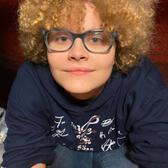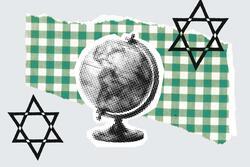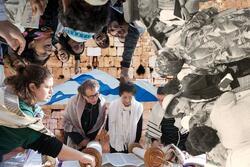There Is No “More" or “Less” Jewish: Reflections on Jewish Diversity
What does it mean to be Jewish? As someone who’s spent the last year participating in the Rising Voices Fellowship, surrounded by many new Jewish friends, this is a question I’ve been thinking about a lot.
It’s a question that has different answers depending on who you ask. There are many cultural groups, regional groups, and levels of observance within Judaism. The most common branches are Orthodox, Conservative, and Reform, each with its own interpretations of Judaism and views on how to “properly” observe tradition. It gets even more complicated when you consider the kinds of Judaism within and beside the three main branches: Modern Orthodox, Reconstructionist, Chasidic, Humanistic, and many more, each with their own customs and traditions. This inherent diversity of Jewish practice inevitably gives rise to a second question: Is there a way to be “more” or “less” Jewish?
A simple answer might be yes—it seems kind of obvious to say that Orthodox Jews adhere more strictly to Jewish law than, say, Reform Jews. Orthodox Jews typically celebrate more minor holidays, are more likely to speak Hebrew, and adhere to traditional norms, such as keeping kosher or dressing modestly. However, I question if “more traditional” necessarily means “more religious.”
This question is hard to answer because you first must define what “religious” means. Does it mean following the letter of the law, believing in a traditional depiction of God, engaging in community traditions, or something else entirely?
There isn’t one right way to answer this question, since religion is an incredibly subjective concept, and what it means to be religious varies from person to person. To me, part of what makes the Jewish community so wonderful is the amount of religious variation contained within it. I don’t necessarily see diverse levels of observance as some groups being “more Jewish” than others. Instead, I believe that a Jew is a Jew is a Jew—all branches are Jewish, just differently.
A good example of this is the variety of ways services are conducted. Synagogue services are typically longer at Orthodox shuls and primarily delivered in Hebrew, while Reform services are usually shorter and mostly in English (or the language of the country the shul is in). Orthodox holiday services also usually stick mostly to the letter of the Torah, while Reform services tend to focus more on Jewish culture and tradition as a whole. Neither type of service is “more” or “less” anything; they’re simply two different ways that communities come together to celebrate Jewish tradition.
The idea of what makes a group religious is an infinitely complicated one (and one that can’t just be addressed in a blog post), but it’s brought up frequently and tends to be used to make judgments of others. Sometimes, Reform or Reconstructionist Jews can be made to feel that they’re doing Judaism “incorrectly” or “not enough.” This is certainly something I’ve felt before, such as when I’m talking to another Jew and they find out that I didn’t have a bar mitzvah and I don’t regularly attend synagogue, and they make a comment about how I’m “not really” Jewish. However, at the same time, Orthodox or Conservative Jews can be made to feel like they’re “too Jewish.” This is an experience I’ve heard about from some of my more observant friends, such as when non-Jews assume they hold certain stereotypical beliefs simply because they’re Jewish.
What this means is that the assumption that some Jewish groups are more or less Jewish than others hurts Jews from many different denominations. People are made to feel like their Judaism is inadequate and they need to somehow change the way they practice to be “correct,” But in reality, there is no one way to observe Jewish tradition. In the ideal world, we could move away from this idea as a community and focus more on appreciating the differences and variations in our culture. When we allow all members of our community to celebrate their way of being Jewish, we create a more accepting environment for everyone. For me, this environment has been my time in the Rising Voices Fellowship, and I hope everyone gets a chance to experience a community like this, too.
This piece was written as part of JWA’s Rising Voices Fellowship.







